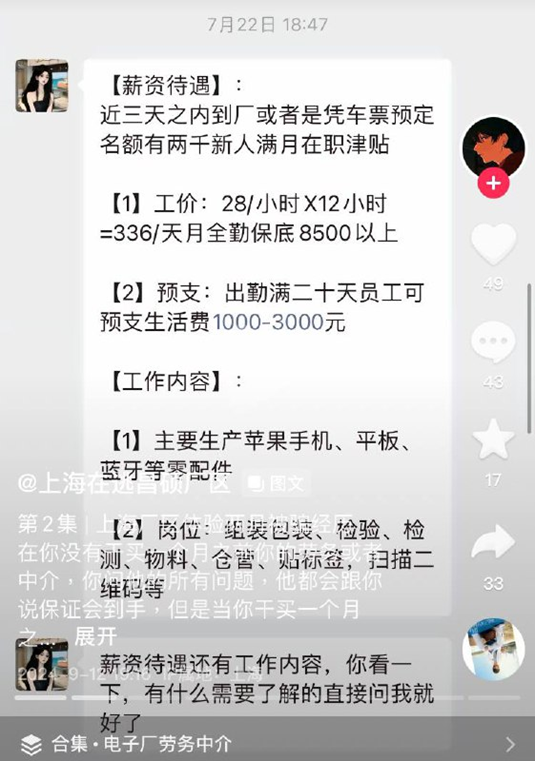
photo credit: Gorodenkoff/ Shutter Stock
- Luxshare's acquisition of Pegatron's subsidiary Protek has led to protests as workers were pressured into transferring contracts to a new subsidiary, Xianshuo, under threats of losing overtime pay;
- At Xianshuo and Protek, workers depend on excessive overtime to supplement low base wages, often working 12-hour shifts to make ends meet, highlighting the disparity between earnings and Shanghai's living wage;
- In a rare move, the Protek union supported workers' protests, advocating for fair treatment.
The Center for Research on Multinational Corporations (SOMO) published a detailed description of the merger and a visual representation of the firm's corporate structure before and after the acquisition. Here's the link to the piece.
In a bold move shaking up the manufacturing landscape, mainland contract manufacturer Luxshare Precision has acquired a series of iPhone production facilities in Jiangsu and Shanghai from Taiwanese contract manufacturers Wistron and Pegatron. Earlier this year, Luxshare solidified its presence in Shanghai by taking over Apple supplier and Pegatron subsidiary Protek through its newly established entity Lizhen Precision, also known as Luxshan Precision. The factory was then re-registered under a new subsidiary, Xianshuo Technology, majority-owned by Lizhen.
Tensions quickly escalated when, on July 18th, over a thousand workers from the Shanghai facility initiated a collective action against Protek. Halting production, they took to the factory grounds, posting videos of the action on social media. The protest was fueled by the company’s push to transfer their contracts to Xianshuo without providing the severance pay due from Protek. This transfer would have caused many to lose their accumulated seniority, despite the company's promise of a three-party agreement to address the issue. As Apple readied for a September iPhone launch, Xianshuo rushed to recruit new workers and transfer existing contracts.
Workers who refused to sign new contracts were threatened with the cancellation of overtime through the imposition of a mandatory “8-hour, 5-day work schedule,” as well as the loss of standard bonuses. Since overtime composes the bulk of the total wage for such workers, this was essentially a threat to cut their incomes by more than half. Meanwhile, numerous recruitment agencies were offering high signing bonuses to attract hourly workers for the new subsidiary but, according to several Xianshuo employees, these bonuses were often not paid out.

Photo: A social media post illustrating how workers have been compelled to switch their contracts to Xianshuo.
From Protek to Xianshuo, Workers Subsist on Long Hours
In China's manufacturing industry, a persistent "low pay plus overtime" model has left workers with little choice but to clock in extra hours to secure a livable income. At Xianshuo, the base salary aligns with Shanghai minimum wage of 2,690 yuan per month. However, after deducting expenses for accommodation, utilities, and other fees, workers typically bring home between 4,000 and 5,000 yuan monthly, thanks to standard overtime. The proposed shift to an "8-hour, 5-day" workweek effectively pressured employees into accepting new contracts, as overtime constitutes nearly half of their total earnings. This reliance on overtime highlights the precarious balance workers must maintain to achieve financial stability. For reference, the Global Living Coalition estimated the monthly living wage for Shanghai to be 5,114 yuan, underscoring the gap between current earnings and what is necessary for a decent standard of living.
As a result of this practice, working hours across the manufacturing sector regularly exceed the legal limits (a phenomenon we detailed in a recent report). Protek is no exception. In March of this year, several workers reported working 12-hour days at the factory. However, after deductions for food and breaks, they only had 10 hours accounted for, such that their monthly income was roughly 4,000 yuan. Nor are conditions at the new subsidiary any better. According to an ad for Xianshuo posted by a labour recruitment agency in June, workers’ base wage was 2,690 yuan per month, and monthly overtime compensation could exceed 3,000 yuan. In early October, one Xianshuo worker posted his income to social media, showing that he had earned more than 3,792 yuan in overtime pay in the previous month.

This image shows overtime pay for a worker at Xianshuo. At 3,792 yuan, the overtime pay far exceeds the base wage of 2,690 yuan.
A Protek worker detailed his gruelling schedule as an hourly employee hired through a labour agency, enduring 12-hour shifts six days a week. With just four days off monthly, he logged approximately 324 hours in August and 312 in September. Despite the exhausting routine of standing all day in front of a screen, both the company and agency delayed his promised pay, leaving him with just over 4,000 yuan for each month. Unable to leave due to unpaid wages, he finally exited Protek Shanghai at the end of October after completing 90 days.

This ad from a labour recruitment agency states that full-time workers at Protek can work up to 336 days a year, which equates to roughly 12-hour days with only 2.5 days off per month.
Pressured to Sign, Workers Find Unexpected Support from the Union
From labour agencies to hourly workers to formal employees, it is widely recognised that overtime constitutes a significant portion of overall pay. This situation is evident at companies like Protek and Xianshuo, where employees regularly work 12-hour shifts, often exceeding 300 hours per month, in clear violation of Chinese labour laws. Protek reportedly uses the threat of enforcing a standard "8-hour, 5-day" workweek to pressure workers into accepting new terms, leaving them without a means to claim their owed compensation.
In an unexpected move, the Protek union supported workers' protests by addressing their grievances with management as complaints mounted in the spring. The union proposed that the company either buy out workers' accumulated seniority and terminate their contracts or honour the original contractual terms. This approach is unusual in China's labour relations system, where unions seldom advocate for workers by submitting proposals, addressing complaints, or taking substantial action to protect workers' rights. This observation is supported by CLB’s extensive investigative work on how unions respond to collective actions.

Photo: The Protek union's proposal to the company in spring 2024, archived by CLB.
Typically, company unions in China are led by senior staff or are under management's influence, often failing to defend employees when their rights are violated. However, the Protek union's recent actions suggest these unions can step up when necessary—or at least start learning how to do so. As Apple suppliers, Protek, Xianshuo, and parent company Luxshare Precision need to address their misleading employment practices and tactics that undermine workers' rights. The industry as a whole should consider addressing the issues of excessive overtime and low pay by implementing policies that prioritise workers’ health and safety.
This is a translation of an article that was previously published on our Chinese website: 上海昌硕科技以5天8小时工作制为胁 要求工人无偿转签弦硕
